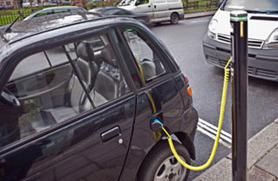This post, part of a series we're running all about electric cars, was written by Kristen Hall-Geisler from HowStuffWorks.com.
Coming soon to a garage near you: Electric vehicles! Big-name auto makers like Nissan, Ford, and Mitsubishi are scheduled for major EV releases in the next year or so, while small car makers are busy building small electric vehicles for short trips around the neighborhood. There's no question that you like the planet; and everyone knows you like new technology, too. But how long will an EV will have to be plugged into the wall before it's ready for its next silent neighborhood mission?
Advertisement
The quick answer to that question is overnight. Most EVs that will be on the market within the next few years will need to be plugged in overnight to fully charge. But the correct answer, as with so many things, is, "it depends." It depends on the type of batteries in the car and it depends on the type of outlet you're using to charge the thing up.
Let's take a few real-world examples:
- The Nissan LEAF uses lithium-ion batteries, just like your laptop and your cell phone, but it uses a lot more of them. It can charge overnight (8 hours) at a 220/240-volt Nissan charging dock that's installed in your garage. It can also charge at a 110/120-volt outlet, the kind you plug your laptop and cell phone into, but it'll take far, far longer.
- The sexy Tesla Roadster uses lithium-ion batteries, too, but the 240-volt Tesla High Power Wall Connector, as they call it, can charge that baby in a mere 3.5 hours. But before you open your wallet, you should know that this is also one of the most expensive EVs on the road.
- A little neighborhood electric vehicle (NEV), like the cars from GEM (Global Electric Motorcars), uses lead-acid batteries. This technology is older, proven to be reliable and charges in about 6 to 8 hours at a standard 110-volt outlet. So what's the tradeoff? A maximum speed of just 25 miles per hour (40.2 kilometers per hour).
So the heavy-duty recharging will happen in your home (over the course of several hours) at the charging station designed for your specific vehicle. But most of the cars coming to market in the next few years, like the Nissan LEAF, for instance, will allow you to "top off" at a standard outlet for a little extra juice while you're out and about.
Advertisement
